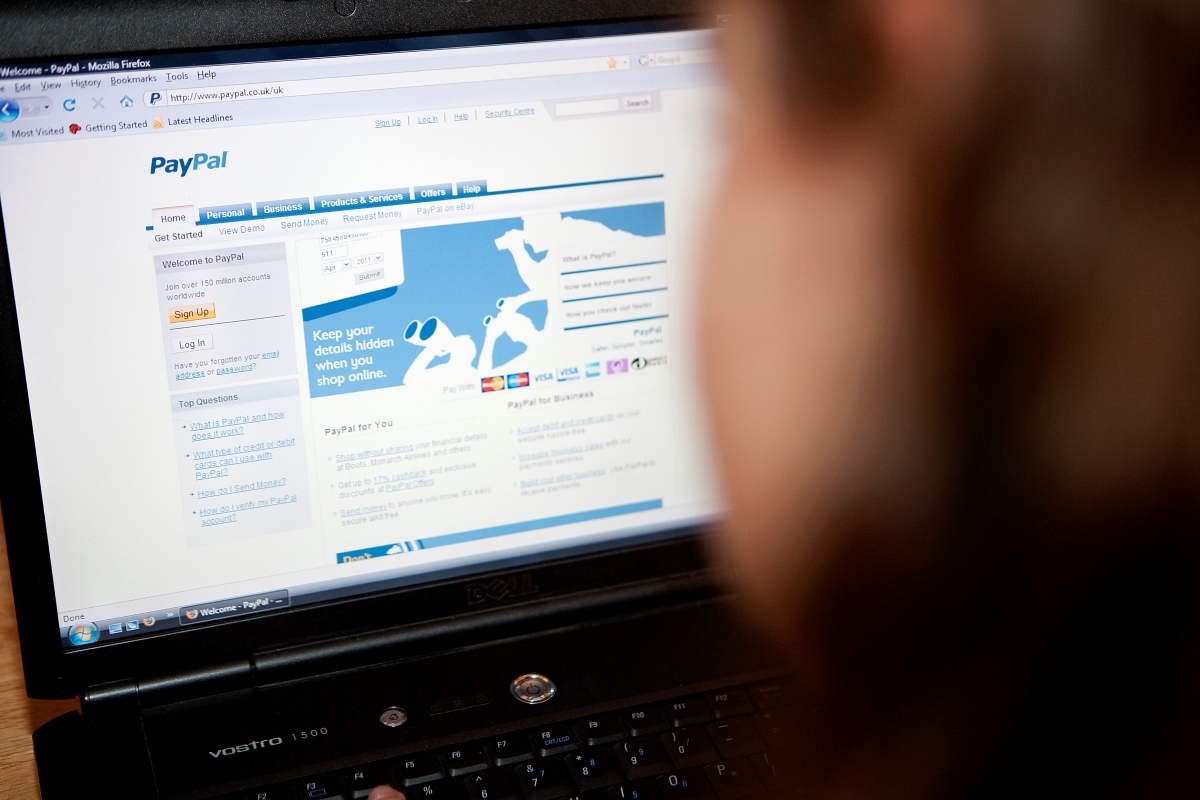Home>Finance>When Does Paypal Credit Report To Credit Bureau


Finance
When Does Paypal Credit Report To Credit Bureau
Modified: February 21, 2024
Learn how and when PayPal Credit reports to credit bureaus in our comprehensive finance guide. Gain insights into how it can impact your credit score and financial standing.
(Many of the links in this article redirect to a specific reviewed product. Your purchase of these products through affiliate links helps to generate commission for LiveWell, at no extra cost. Learn more)
Table of Contents
- Introduction
- Understanding Credit Reporting
- Overview of PayPal Credit
- Does PayPal Credit Report to Credit Bureaus?
- Factors Affecting Credit Reporting by PayPal Credit
- Benefits of PayPal Credit Reporting to Credit Bureaus
- Potential Impact on Credit Score
- Steps to Improve Credit Score with PayPal Credit
- Conclusion
Introduction
When it comes to managing our finances, credit plays a crucial role. A good credit score opens up doors to various opportunities, such as obtaining loans, securing lower interest rates, and even renting an apartment. Understanding how credit reporting works is essential for maintaining a healthy financial profile.
One popular financial service that many individuals rely on is PayPal Credit. With PayPal Credit, users can make purchases online and pay them off over time. However, a common question that arises is whether PayPal Credit reports to credit bureaus. In this article, we will delve into this topic and shed light on the impact it can have on your credit profile.
Before exploring PayPal Credit’s credit reporting practices, let’s briefly understand credit reporting.
Credit reporting: Credit reporting is the process by which lenders and financial institutions share information about a borrower’s credit history with credit bureaus. Credit bureaus compile this information and produce credit reports, which provide a snapshot of an individual’s creditworthiness. This information includes details about loans, credit cards, payment history, and any negative information such as late payments or defaults.
Now that we have a basic understanding of how credit reporting works, let’s take a closer look at PayPal Credit.
Understanding Credit Reporting
Credit reporting is an essential part of the financial system, as it helps lenders and financial institutions assess the creditworthiness of individuals and make informed decisions about lending. Credit reporting agencies, also known as credit bureaus, collect information from various sources, such as banks, credit card companies, and lenders, and compile it into credit reports.
These credit reports contain a wealth of information, including personal details, such as your name and address, as well as financial details, such as your credit accounts, payment history, and outstanding debts. Lenders and creditors use these reports to evaluate the risk of lending to an individual and determine the terms and conditions of credit.
There are three major credit bureaus in the United States: Equifax, Experian, and TransUnion. These bureaus collect and maintain your credit information, and they each have their own scoring models to calculate your credit scores. These scores range from 300 to 850, with higher scores indicating lower credit risk.
It’s important to note that not all lenders or creditors report to all three credit bureaus. Some may report to only one or two, while others may report to all three. This means that your credit information and scores may vary slightly across different bureaus.
When it comes to credit reporting, it’s crucial to be aware of what information is being reported and how it can impact your credit profile. Positive information, such as timely payments and low credit utilization, can help boost your credit scores, while negative information, like late payments or defaults, can lower your scores.
Regularly monitoring your credit reports is essential to ensure their accuracy and identify any potential errors or fraudulent activities. Under the Fair Credit Reporting Act (FCRA), consumers are entitled to a free copy of their credit report from each bureau once every 12 months. By taking advantage of this, you can stay informed about your credit standing and take steps to improve it if necessary.
Now that we have a solid understanding of credit reporting, let’s explore how PayPal Credit fits into this system.
Overview of PayPal Credit
PayPal Credit is a credit product offered by PayPal, a well-known payment platform that allows users to make purchases online. Formerly known as “Bill Me Later,” PayPal Credit provides users with a line of credit that can be used for online purchases at select merchants.
Unlike a traditional credit card, PayPal Credit operates as a digital line of credit that is used exclusively for online transactions. Users can apply for PayPal Credit directly through their PayPal account and, if approved, can start using it immediately for eligible purchases.
With PayPal Credit, users have the flexibility to make purchases and pay them off over time. Depending on the terms and promotions available, there may be interest-free periods or reduced interest rates for specific purchases. This allows users to manage their cash flow more effectively and potentially make larger purchases without immediate payment.
PayPal Credit is widely accepted by various online merchants, making it a convenient and accessible credit option for users. It provides an additional layer of security as it utilizes PayPal’s robust payment infrastructure, which includes buyer protection, dispute resolution, and secure transaction processing.
Now that we have a general understanding of PayPal Credit, let’s delve into the crucial question: Does PayPal Credit report to credit bureaus?
Does PayPal Credit Report to Credit Bureaus?
One of the most significant factors in building and maintaining a good credit score is having credit accounts reported to credit bureaus. Reporting positive credit information to credit bureaus helps demonstrate responsible credit behavior and can have a positive impact on your credit score.
When it comes to PayPal Credit, the answer is yes, it does report to credit bureaus. PayPal Credit reports information about your credit activity to the major credit bureaus—Equifax, Experian, and TransUnion.
This means that your payment history, credit utilization, account status, and other relevant information are regularly reported to these bureaus. So, if you consistently make on-time payments and manage your PayPal Credit account responsibly, it can help you establish and improve your credit history.
It’s important to note that while PayPal Credit reports to credit bureaus, individual merchants who accept PayPal as a payment method may not report specific purchases made using PayPal Credit. The reporting of specific transactions can vary from merchant to merchant. However, PayPal Credit still reports the overall account activity, including credit limits, outstanding balances, and payment history.
By having your PayPal Credit account reported to credit bureaus, you have the opportunity to showcase your creditworthiness and build a positive credit history, which can be beneficial in future credit applications.
Now that we know PayPal Credit reports to credit bureaus, let’s explore some of the factors that can affect credit reporting by PayPal Credit.
Factors Affecting Credit Reporting by PayPal Credit
While PayPal Credit does report to the major credit bureaus, there are several factors that can influence how its reporting affects your credit profile.
1. Payment History: Your payment history is one of the most crucial factors in determining your creditworthiness. Making on-time payments is essential for maintaining a positive credit history. Consistently paying your PayPal Credit bills on time will reflect positively on your credit report and contribute to improving your credit score.
2. Credit Utilization: Credit utilization refers to the amount of available credit you are using. Keeping your credit utilization low is important for maintaining a healthy credit profile. Utilizing a high percentage of your available credit can negatively impact your credit score. Paying off your PayPal Credit balances regularly and keeping them relatively low can positively contribute to your credit utilization ratio.
3. Account Age: The age of your PayPal Credit account can also influence credit reporting. Generally, having an older credit account can be seen as more favorable as it demonstrates a longer credit history. Therefore, keeping your PayPal Credit account open and active for an extended period can benefit your credit profile.
4. Credit Limits and Balances: The credit limits on your PayPal Credit account and your outstanding balances can impact your credit reporting. It’s important to manage your credit limits responsibly and avoid carrying high balances. A low credit utilization ratio, where you’re utilizing a small portion of your available credit, is generally beneficial for your credit score.
5. Other Credit Factors: It’s important to remember that PayPal Credit is just one aspect of your overall credit profile. Other factors like your payment history on other credit accounts, the diversity of your credit mix, and any negative information on your credit report can impact your overall creditworthiness.
By considering these factors, you can take proactive steps to manage your PayPal Credit account responsibly and optimize its impact on your credit report. Now, let’s explore the benefits of PayPal Credit reporting to credit bureaus.
Benefits of PayPal Credit Reporting to Credit Bureaus
The fact that PayPal Credit reports to credit bureaus can bring several benefits to individuals who use this credit service:
1. Building and Improving Credit History: PayPal Credit reporting to credit bureaus allows you to establish and build a credit history. By making on-time payments and managing your account responsibly, you can demonstrate positive credit behavior and improve your credit profile. This can be particularly beneficial if you are new to credit or have a limited credit history.
2. Positive Impact on Credit Score: Consistently making timely payments and maintaining a low credit utilization ratio with your PayPal Credit account can have a positive impact on your credit score. By demonstrating responsible credit management, you can boost your creditworthiness and potentially qualify for better terms and rates on future credit applications.
3. Access to Better Credit Opportunities: A history of responsible credit usage, as reflected in your credit report due to PayPal Credit reporting, can open up doors to better credit opportunities. Lenders and creditors often look at your credit report to evaluate your creditworthiness. By maintaining a positive credit history with PayPal Credit, you increase your chances of being approved for loans, credit cards, and other credit products with favorable terms.
4. Increased Credit Limit: As you demonstrate responsible credit usage and your creditworthiness improves, PayPal Credit may increase your credit limit. A higher credit limit can provide you with additional purchasing power and flexibility while maintaining a low credit utilization ratio. This can further strengthen your credit profile.
5. Enhanced Financial Flexibility: PayPal Credit can provide you with greater financial flexibility by allowing you to make purchases and pay them off over time. This can be especially useful for larger or unexpected expenses where immediate payment may be challenging. By utilizing PayPal Credit responsibly and making timely payments, you can enjoy the benefits of this financial flexibility without it negatively impacting your credit score.
With these benefits in mind, it becomes evident that PayPal Credit reporting to credit bureaus can have a positive impact on your credit profile. However, it’s essential to understand the potential impact on your credit score and take steps to improve it further.
In the next section, we will discuss the potential impact of PayPal Credit reporting on your credit score and provide steps to improve your credit score while using PayPal Credit.
Potential Impact on Credit Score
The reporting of your PayPal Credit account to credit bureaus can have both positive and negative impacts on your credit score. Understanding these potential effects is crucial for managing your credit wisely.
Positive Impact: By using PayPal Credit responsibly and making on-time payments, you can build a positive credit history. This can lead to an increase in your credit score over time. Your payment history and credit utilization ratio are significant factors that contribute to your credit score, and consistently managing these aspects with PayPal Credit can demonstrate responsible credit behavior.
Negative Impact: Failing to make timely payments or carrying high balances on your PayPal Credit account can have negative consequences for your credit score. Late payments and high credit utilization can significantly lower your credit score. It’s important to make payments on time and keep your balances as low as possible to minimize any negative impact on your credit profile.
It’s essential to note that your PayPal Credit account is just one part of your overall credit history. Other factors, such as your payment history with other lenders, credit mix, and the length of your credit history, also play a role in determining your credit score.
While PayPal Credit reporting can influence your credit score, it’s important to remember that improving your credit requires a comprehensive approach. Beyond managing your PayPal Credit account responsibly, it’s important to make timely payments on all your credit obligations, keep credit card balances low, and avoid opening multiple new credit accounts simultaneously.
Now, let’s explore some steps you can take to improve your credit score while using PayPal Credit.
Steps to Improve Credit Score with PayPal Credit
If you’re looking to improve your credit score while utilizing PayPal Credit, here are some actionable steps you can take:
1. Make Timely Payments: Paying your PayPal Credit bills on time is crucial for maintaining a positive credit history. Late payments can have a significant negative impact on your credit score. Set reminders or enroll in automatic payments to ensure you never miss a payment.
2. Keep Credit Utilization Low: Aim to keep your credit utilization ratio—the percentage of your available credit that you’re currently using—low. Keeping your balances below 30% of your credit limit is generally recommended. By paying off your PayPal Credit balances regularly and consistently, you can maintain a low credit utilization ratio and positively influence your credit score.
3. Monitor Your Credit Report: Regularly monitor your credit report from all three major credit bureaus—Equifax, Experian, and TransUnion—to ensure accuracy and identify any errors or fraudulent activities. You can request a free copy of your credit report annually from each bureau. If you notice any discrepancies, promptly dispute them to have them corrected.
4. Avoid Opening Multiple Credit Accounts: While PayPal Credit can be a useful credit tool, it’s important to avoid opening multiple new credit accounts simultaneously. Each new credit application can result in a hard inquiry on your credit report, which can temporarily lower your credit score. Be selective and thoughtful in your credit applications.
5. Keep Your PayPal Credit Account Active: The age of your credit accounts can impact your credit score. Keeping your PayPal Credit account open and active can help establish a longer credit history and potentially boost your credit score. However, ensure that you’re using the account responsibly and making timely payments.
6. Practice Overall Responsible Credit Management: Your PayPal Credit account is just one part of your credit profile. To improve your credit score holistically, it’s important to practice responsible credit management across all of your credit obligations. Make timely payments on all your credit accounts, maintain a diverse credit mix if possible, and avoid excessive debt.
By following these steps, you can gradually improve your credit score while effectively using PayPal Credit. It’s a process that requires patience and consistency, but with responsible credit management, you can enhance your creditworthiness over time.
Finally, let’s summarize what we’ve discussed so far.
Conclusion
PayPal Credit reporting to credit bureaus can have a significant impact on your credit profile and overall financial well-being. By understanding how credit reporting works and the factors that influence it, you can leverage PayPal Credit to improve and maintain a healthy credit score.
PayPal Credit reports to the major credit bureaus, allowing you to build a positive credit history and demonstrate responsible credit behavior. By making timely payments, keeping your credit utilization low, and managing your PayPal Credit account effectively, you can work towards improving your credit score.
It’s important to note that PayPal Credit is just one aspect of your credit profile. To achieve long-term financial success, it’s crucial to practice responsible credit management across all your credit obligations. Regularly monitor your credit report for accuracy and take steps to correct any errors or discrepancies.
Using PayPal Credit can provide you with financial flexibility and convenience, but it’s vital to use it responsibly. Make sure to make payments on time, keep your balances low, and avoid excessive debt. By doing so, you can maximize the benefits of PayPal Credit and improve your creditworthiness.
Remember, improving your credit score is a gradual process that requires patience and consistency. With your PayPal Credit account as one piece of the puzzle, along with responsible credit habits, you can enhance your creditworthiness over time and open up doors to better credit opportunities.
In summary, utilizing PayPal Credit’s credit reporting to your advantage can contribute to long-term financial success. Take proactive steps to manage your credit responsibly, monitor your credit profile, and continue to educate yourself on credit-related matters.
By doing so, you can establish a strong credit foundation, achieve your financial goals, and navigate the world of credit with confidence.














